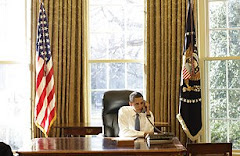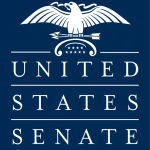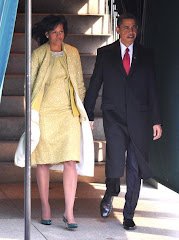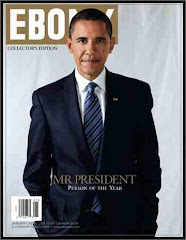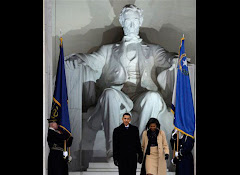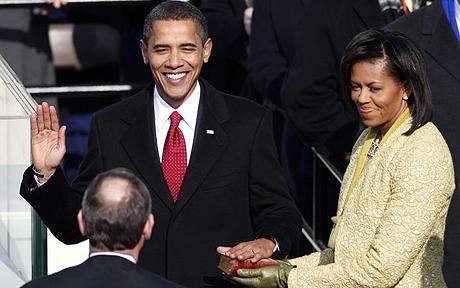
THE WHITE HOUSE
Office of the Press Secretary
______________________________________________________________________________________________ March 27, 2009
REMARKS BY THE PRESIDENT
ON A NEW STRATEGY FOR AFGHANISTAN AND PAKISTAN
Room 450
Dwight D. Eisenhower Executive Office Building
9:40 A.M. EDT
THE PRESIDENT: Good morning. Please be seated.
Before I begin today, let me acknowledge, first of all, Your Excellencies, all the ambassadors who are in attendance. I also want to acknowledge both the civilians and our military personnel that are about to be deployed to the region. And I am very grateful to all of you for your extraordinary work.
I want to acknowledge General David Petraeus, who's here, and has been doing an outstanding job at CENTCOM, and we appreciate him. I want to thank Bruce Reidel -- Bruce is down at the end here -- who has worked extensively on our strategic review. I want to acknowledge Karl Eikenberry, who's here, and is our Ambassador-designate to Afghanistan . And to my national security team, thanks for their outstanding work.
Today, I'm announcing a comprehensive, new strategy for Afghanistan and Pakistan . And this marks the conclusion of a careful policy review, led by Bruce, that I ordered as soon as I took office. My administration has heard from our military commanders, as well as our diplomats. We've consulted with the Afghan and Pakistani governments, with our partners and our NATO allies, and with other donors and international organizations. We've also worked closely with members of Congress here at home. And now I’d like to speak clearly and candidly to the American people.
The situation is increasingly perilous. It's been more than seven years since the Taliban was removed from power, yet war rages on, and insurgents control parts of Afghanistan and Pakistan . Attacks against our troops, our NATO allies, and the Afghan government have risen steadily. And most painfully, 2008 was the deadliest year of the war for American forces.
Many people in the United States -- and many in partner countries that have sacrificed so much -- have a simple question: What is our purpose in Afghanistan ? After so many years, they ask, why do our men and women still fight and die there? And they deserve a straightforward answer.
So let me be clear: Al Qaeda and its allies -- the terrorists who planned and supported the 9/11 attacks -- are in Pakistan and Afghanistan . Multiple intelligence estimates have warned that al Qaeda is actively planning attacks on the United States homeland from its safe haven in Pakistan . And if the Afghan government falls to the Taliban -- or allows al Qaeda to go unchallenged -- that country will again be a base for terrorists who want to kill as many of our people as they possibly can.
The future of Afghanistan is inextricably linked to the future of its neighbor, Pakistan . In the nearly eight years since 9/11, al Qaeda and its extremist allies have moved across the border to the remote areas of the Pakistani frontier. This almost certainly includes al Qaeda's leadership: Osama bin Laden and Ayman al-Zawahiri. They have used this mountainous terrain as a safe haven to hide, to train terrorists, to communicate with followers, to plot attacks, and to send fighters to support the insurgency in Afghanistan . For the American people, this border region has become the most dangerous place in the world.
But this is not simply an American problem -- far from it. It is, instead, an international security challenge of the highest order. Terrorist attacks in London and Bali were tied to al Qaeda and its allies in Pakistan , as were attacks in North Africa and the Middle East, in Islamabad and in Kabul . If there is a major attack on an Asian, European, or African city, it, too, is likely to have ties to al Qaeda's leadership in Pakistan . The safety of people around the world is at stake.
For the Afghan people, a return to Taliban rule would condemn their country to brutal governance, international isolation, a paralyzed economy, and the denial of basic human rights to the Afghan people -- especially women and girls. The return in force of al Qaeda terrorists who would accompany the core Taliban leadership would cast Afghanistan under the shadow of perpetual violence.
As President, my greatest responsibility is to protect the American people. We are not in Afghanistan to control that country or to dictate its future. We are in Afghanistan to confront a common enemy that threatens the United States , our friends and our allies, and the people of Afghanistan and Pakistan who have suffered the most at the hands of violent extremists.
So I want the American people to understand that we have a clear and focused goal: to disrupt, dismantle and defeat al Qaeda in Pakistan and Afghanistan , and to prevent their return to either country in the future. That's the goal that must be achieved. That is a cause that could not be more just. And to the terrorists who oppose us, my message is the same: We will defeat you.
To achieve our goals, we need a stronger, smarter and comprehensive strategy. To focus on the greatest threat to our people, America must no longer deny resources to Afghanistan because of the war in Iraq . To enhance the military, governance and economic capacity of Afghanistan and Pakistan , we have to marshal international support. And to defeat an enemy that heeds no borders or laws of war, we must recognize the fundamental connection between the future of Afghanistan and Pakistan -- which is why I've appointed Ambassador Richard Holbrooke, who is here, to serve as Special Representative for both countries, and to work closely with General Petraeus to integrate our civilian and military efforts.
Let me start by addressing the way forward in Pakistan .
The United States has great respect for the Pakistani people. They have a rich history and have struggled against long odds to sustain their democracy. The people of Pakistan want the same things that we want: an end to terror, access to basic services, the opportunity to live their dreams, and the security that can only come with the rule of law. The single greatest threat to that future comes from al Qaeda and their extremist allies, and that is why we must stand together.
The terrorists within Pakistan 's borders are not simply enemies of America or Afghanistan -- they are a grave and urgent danger to the people of Pakistan . Al Qaeda and other violent extremists have killed several thousand Pakistanis since 9/11. They've killed many Pakistani soldiers and police. They assassinated Benazir Bhutto. They've blown up buildings, derailed foreign investment, and threatened the stability of the state. So make no mistake: al Qaeda and its extremist allies are a cancer that risks killing Pakistan from within.
It's important for the American people to understand that Pakistan needs our help in going after al Qaeda. This is no simple task. The tribal regions are vast, they are rugged, and they are often ungoverned. And that's why we must focus our military assistance on the tools, training and support that Pakistan needs to root out the terrorists. And after years of mixed results, we will not, and cannot, provide a blank check.
Pakistan must demonstrate its commitment to rooting out al Qaeda and the violent extremists within its borders. And we will insist that action be taken -- one way or another -- when we have intelligence about high-level terrorist targets.
The government's ability to destroy these safe havens is tied to its own strength and security. To help Pakistan weather the economic crisis, we must continue to work with the IMF, the World Bank and other international partners. To lessen tensions between two nuclear-armed nations that too often teeter on the edge of escalation and confrontation, we must pursue constructive diplomacy with both India and Pakistan . To avoid the mistakes of the past, we must make clear that our relationship with Pakistan is grounded in support for Pakistan 's democratic institutions and the Pakistani people. And to demonstrate through deeds as well as words a commitment that is enduring, we must stand for lasting opportunity.
A campaign against extremism will not succeed with bullets or bombs alone. Al Qaeda's offers the people of Pakistan nothing but destruction. We stand for something different. So today, I am calling upon Congress to pass a bipartisan bill co-sponsored by John Kerry and Richard Lugar that authorizes $1.5 billion in direct support to the Pakistani people every year over the next five years -- resources that will build schools and roads and hospitals, and strengthen Pakistan 's democracy. I'm also calling on Congress to pass a bipartisan bill co-sponsored by Maria Cantwell, Chris Van Hollen and Peter Hoekstra that creates opportunity zones in the border regions to develop the economy and bring hope to places plagued with violence. And we will ask our friends and allies to do their part -- including at the donors conference in Tokyo next month.
I don't ask for this support lightly. These are challenging times. Resources are stretched. But the American people must understand that this is a down payment on our own future -- because the security of America and Pakistan is shared. Pakistan 's government must be a stronger partner in destroying these safe havens, and we must isolate al Qaeda from the Pakistani people. And these steps in Pakistan are also indispensable to our efforts in Afghanistan , which will see no end to violence if insurgents move freely back and forth across the border.
Security demands a new sense of shared responsibility. And that's why we will launch a standing, trilateral dialogue among the United States , Afghanistan and Pakistan . Our nations will meet regularly, with Secretaries Clinton and Secretary Gates leading our effort. Together, we must enhance intelligence sharing and military cooperation along the border, while addressing issues of common concern like trade, energy, and economic development.
This is just one part of a comprehensive strategy to prevent Afghanistan from becoming the al Qaeda safe haven that it was before 9/11. To succeed, we and our friends and allies must reverse the Taliban's gains, and promote a more capable and accountable Afghan government.
Our troops have fought bravely against a ruthless enemy. Our civilians have made great sacrifices. Our allies have borne a heavy burden. Afghans have suffered and sacrificed for their future. But for six years, Afghanistan has been denied the resources that it demands because of the war in Iraq . Now, we must make a commitment that can accomplish our goals.
I've already ordered the deployment of 17,000 troops that had been requested by General McKiernan for many months. These soldiers and Marines will take the fight to the Taliban in the south and the east, and give us a greater capacity to partner with Afghan security forces and to go after insurgents along the border. This push will also help provide security in advance of the important presidential elections in Afghanistan in August.
At the same time, we will shift the emphasis of our mission to training and increasing the size of Afghan security forces, so that they can eventually take the lead in securing their country. That's how we will prepare Afghans to take responsibility for their security, and how we will ultimately be able to bring our own troops home.
For three years, our commanders have been clear about the resources they need for training. And those resources have been denied because of the war in Iraq . Now, that will change. The additional troops that we deployed have already increased our training capacity. And later this spring we will deploy approximately 4,000 U.S. troops to train Afghan security forces. For the first time, this will truly resource our effort to train and support the Afghan army and police. Every American unit in Afghanistan will be partnered with an Afghan unit, and we will seek additional trainers from our NATO allies to ensure that every Afghan unit has a coalition partner. We will accelerate our efforts to build an Afghan army of 134,000 and a police force of 82,000 so that we can meet these goals by 2011 -- and increases in Afghan forces may very well be needed as our plans to turn over security responsibility to the Afghans go forward.
This push must be joined by a dramatic increase in our civilian effort. Afghanistan has an elected government, but it is undermined by corruption and has difficulty delivering basic services to its people. The economy is undercut by a booming narcotics trade that encourages criminality and funds the insurgency. The people of Afghanistan seek the promise of a better future. Yet once again, we've seen the hope of a new day darkened by violence and uncertainty.
So to advance security, opportunity and justice -- not just in Kabul , but from the bottom up in the provinces -- we need agricultural specialists and educators, engineers and lawyers. That's how we can help the Afghan government serve its people and develop an economy that isn't dominated by illicit drugs. And that's why I'm ordering a substantial increase in our civilians on the ground. That's also why we must seek civilian support from our partners and allies, from the United Nations and international aid organizations -- an effort that Secretary Clinton will carry forward next week in The Hague .
At a time of economic crisis, it's tempting to believe that we can shortchange this civilian effort. But make no mistake: Our efforts will fail in Afghanistan and Pakistan if we don't invest in their future. And that's why my budget includes indispensable investments in our State Department and foreign assistance programs. These investments relieve the burden on our troops. They contribute directly to security. They make the American people safer. And they save us an enormous amount of money in the long run -- because it's far cheaper to train a policeman to secure his or her own village than to help a farmer seed a crop -- or to help a farmer seed a crop than it is to send our troops to fight tour after tour of duty with no transition to Afghan responsibility.
As we provide these resources, the days of unaccountable spending, no-bid contracts, and wasteful reconstruction must end. So my budget will increase funding for a strong Inspector General at both the State Department and USAID, and include robust funding for the special inspector generals for Afghan Reconstruction.
And I want to be clear: We cannot turn a blind eye to the corruption that causes Afghans to lose faith in their own leaders. Instead, we will seek a new compact with the Afghan government that cracks down on corrupt behavior, and sets clear benchmarks, clear metrics for international assistance so that it is used to provide for the needs of the Afghan people.
In a country with extreme poverty that's been at war for decades, there will also be no peace without reconciliation among former enemies. Now, I have no illusion that this will be easy. In Iraq , we had success in reaching out to former adversaries to isolate and target al Qaeda in Iraq . We must pursue a similar process in Afghanistan , while understanding that it is a very different country.
There is an uncompromising core of the Taliban. They must be met with force, and they must be defeated. But there are also those who've taken up arms because of coercion, or simply for a price. These Afghans must have the option to choose a different course. And that's why we will work with local leaders, the Afghan government, and international partners to have a reconciliation process in every province. As their ranks dwindle, an enemy that has nothing to offer the Afghan people but terror and repression must be further isolated. And we will continue to support the basic human rights of all Afghans -- including women and girls.
Going forward, we will not blindly stay the course. Instead, we will set clear metrics to measure progress and hold ourselves accountable. We’ll consistently assess our efforts to train Afghan security forces and our progress in combating insurgents. We will measure the growth of Afghanistan ’s economy, and its illicit narcotics production. And we will review whether we are using the right tools and tactics to make progress towards accomplishing our goals.
None of the steps that I've outlined will be easy; none should be taken by America alone. The world cannot afford the price that will come due if Afghanistan slides back into chaos or al Qaeda operates unchecked. We have a shared responsibility to act -- not because we seek to project power for its own sake, but because our own peace and security depends on it. And what’s at stake at this time is not just our own security -- it's the very idea that free nations can come together on behalf of our common security. That was the founding cause of NATO six decades ago, and that must be our common purpose today.
My administration is committed to strengthening international organizations and collective action, and that will be my message next week in Europe . As America does more, we will ask others to join us in doing their part. From our partners and NATO allies, we will seek not simply troops, but rather clearly defined capabilities: supporting the Afghan elections, training Afghan security forces, a greater civilian commitment to the Afghan people. For the United Nations, we seek greater progress for its mandate to coordinate international action and assistance, and to strengthen Afghan institutions.
And finally, together with the United Nations, we will forge a new Contact Group for Afghanistan and Pakistan that brings together all who should have a stake in the security of the region -- our NATO allies and other partners, but also the Central Asian states, the Gulf nations and Iran; Russia, India and China. None of these nations benefit from a base for al Qaeda terrorists, and a region that descends into chaos. All have a stake in the promise of lasting peace and security and development.
That is true, above all, for the coalition that has fought together in Afghanistan , side by side with Afghans. The sacrifices have been enormous. Nearly 700 Americans have lost their lives. Troops from over 20 countries have also paid the ultimate price. All Americans honor the service and cherish the friendship of those who have fought, and worked, and bled by our side. And all Americans are awed by the service of our own men and women in uniform, who've borne a burden as great as any other generation’s. They and their families embody the example of selfless sacrifice.
I remind everybody, the United States of America did not choose to fight a war in Afghanistan . Nearly 3,000 of our people were killed on September 11, 2001, for doing nothing more than going about their daily lives. Al Qaeda and its allies have since killed thousands of people in many countries. Most of the blood on their hands is the blood of Muslims, who al Qaeda has killed and maimed in far greater number than any other people. That is the future that al Qaeda is offering to the people of Pakistan and Afghanistan -- a future without hope or opportunity; a future without justice or peace.
So understand, the road ahead will be long and there will be difficult days ahead. But we will seek lasting partnerships with Afghanistan and Pakistan that promise a new day for their people. And we will use all elements of our national power to defeat al Qaeda, and to defend America , our allies, and all who seek a better future. Because the United States of America stands for peace and security, justice and opportunity. That is who we are, and that is what history calls on us to do once more.
Thank you. God bless you, and God bless the United States of America . (Applause.)
END 10:02 A.M. EDT
B4B








![[Dollar Dominated]](http://s.wsj.net/public/resources/images/P1-AP194B_CHINA_NS_20090323190818.gif)
![[Zhou Xiaochuan, governor of the People's Bank of China.]](http://s.wsj.net/public/resources/images/NA-AW655_CHINAG_DV_20090323160110.jpg) Reuters
Reuters![[The Haves and Have Mores]](http://s.wsj.net/public/resources/images/P1-AP201A_CHINA_NS_20090323194106.gif)





